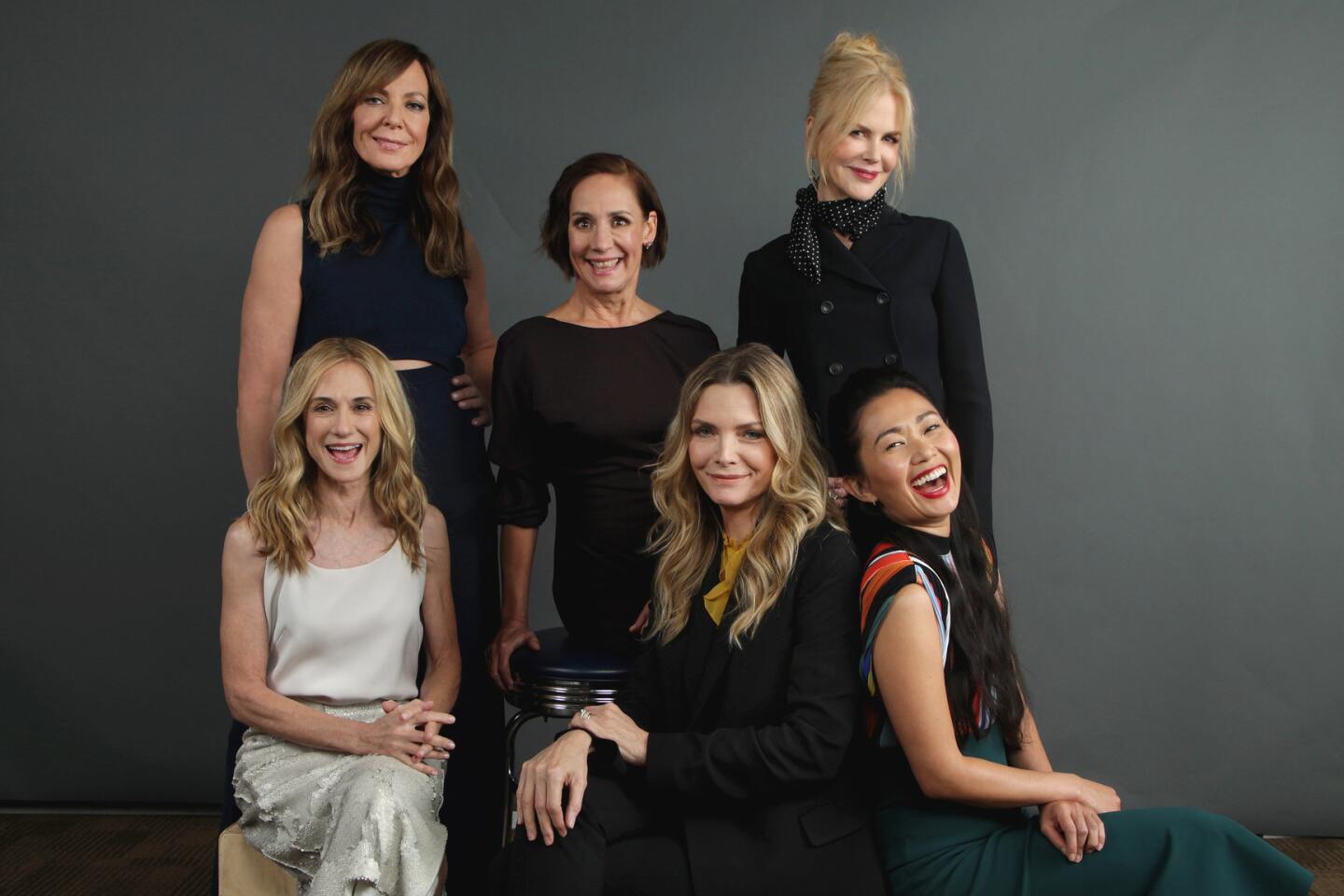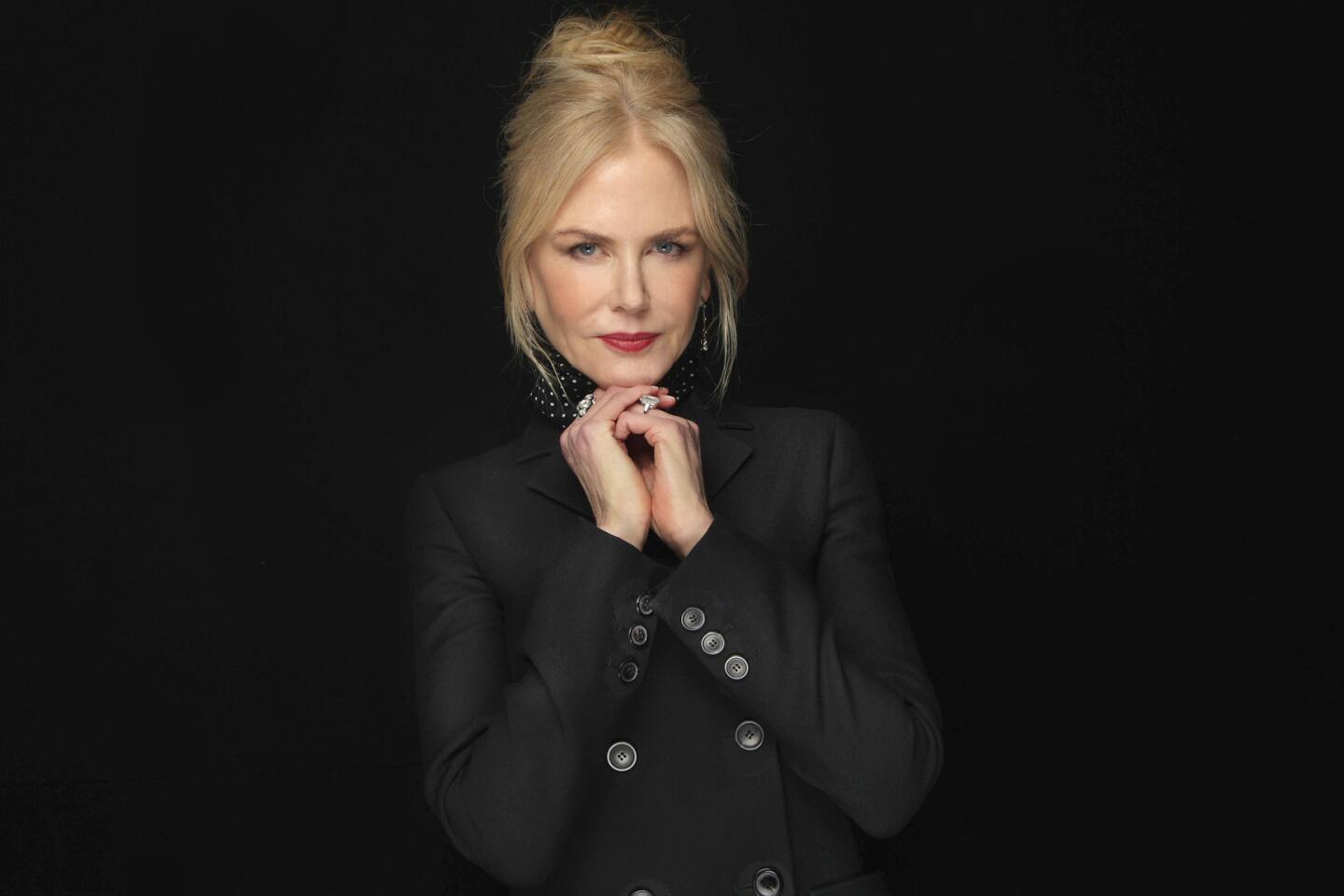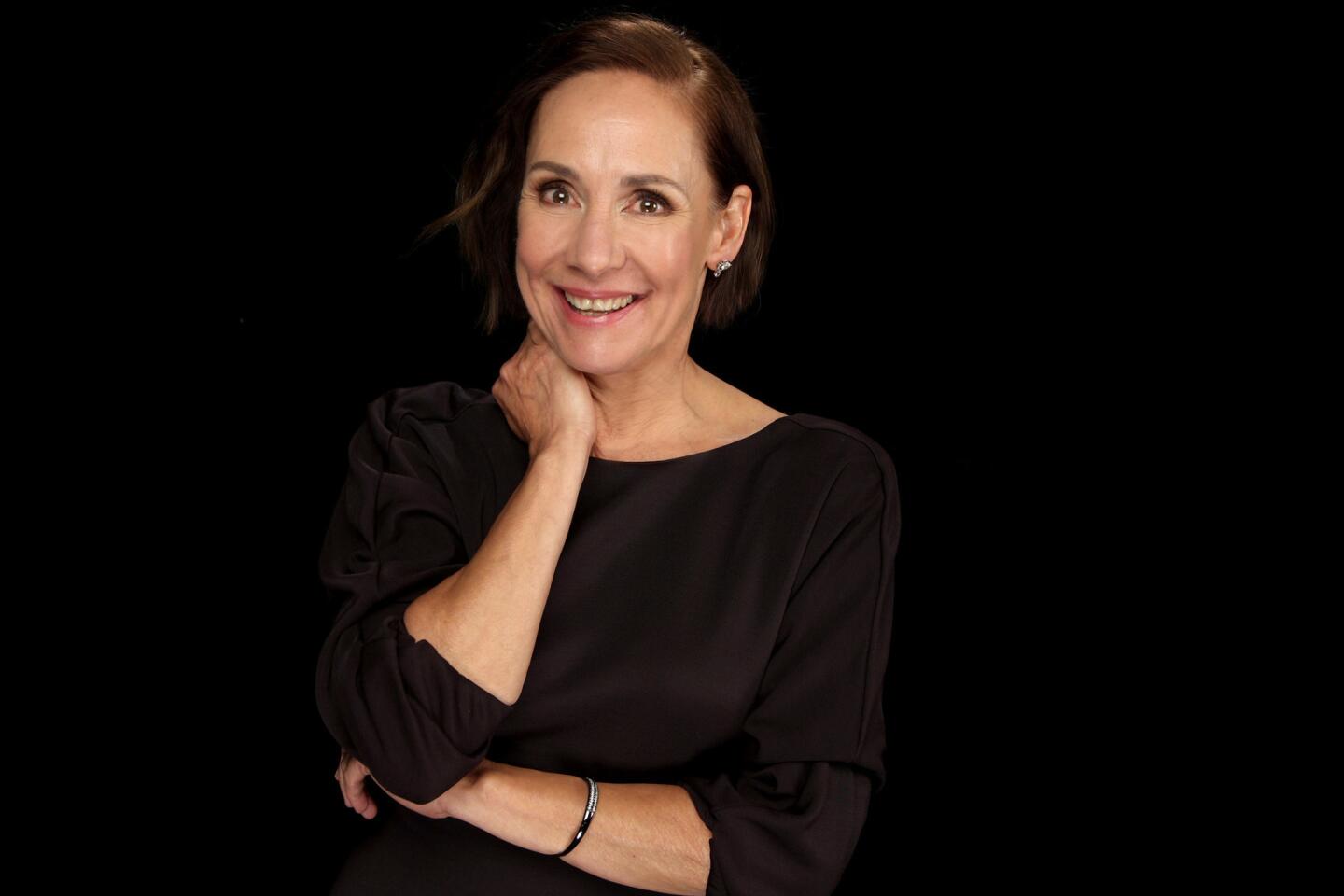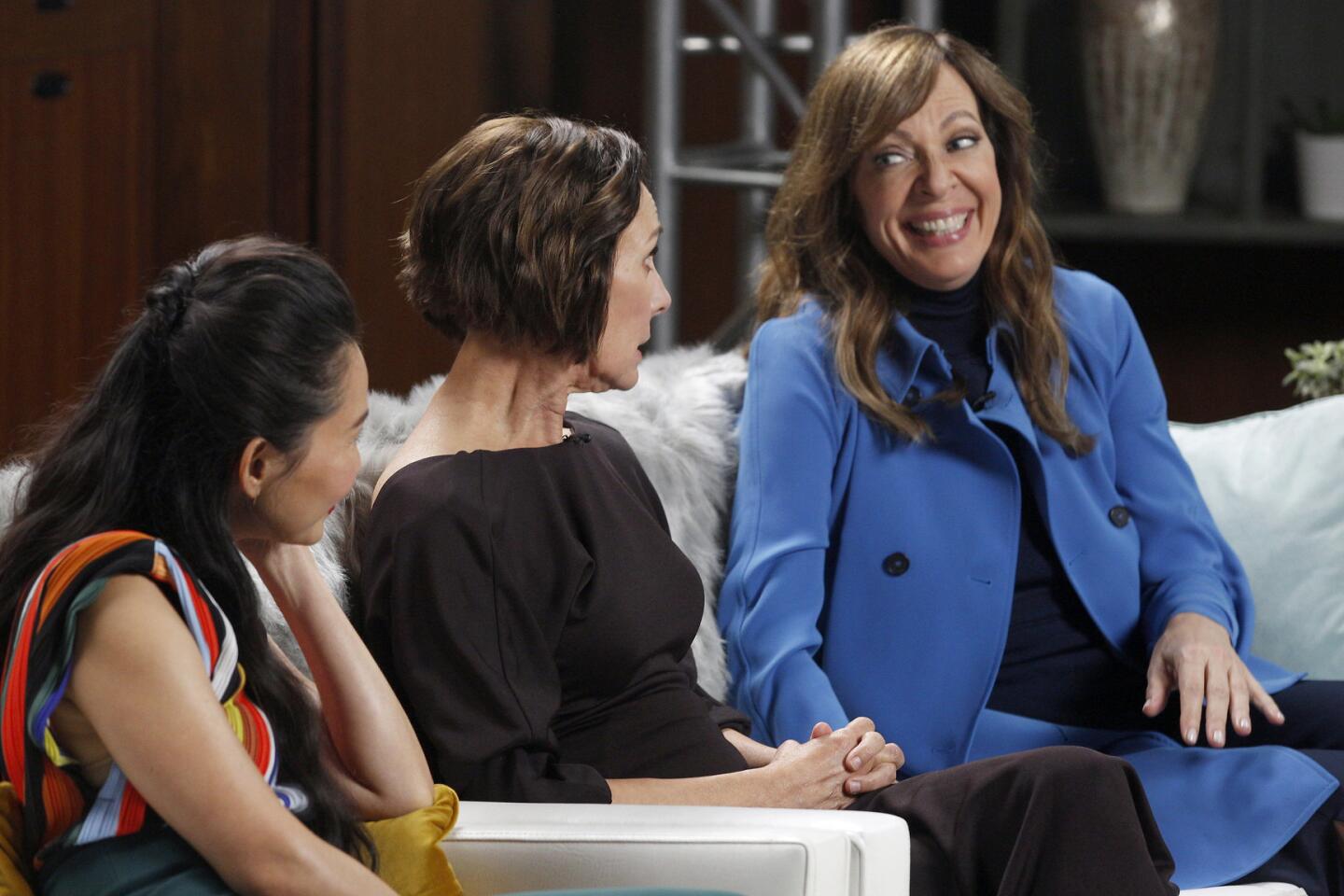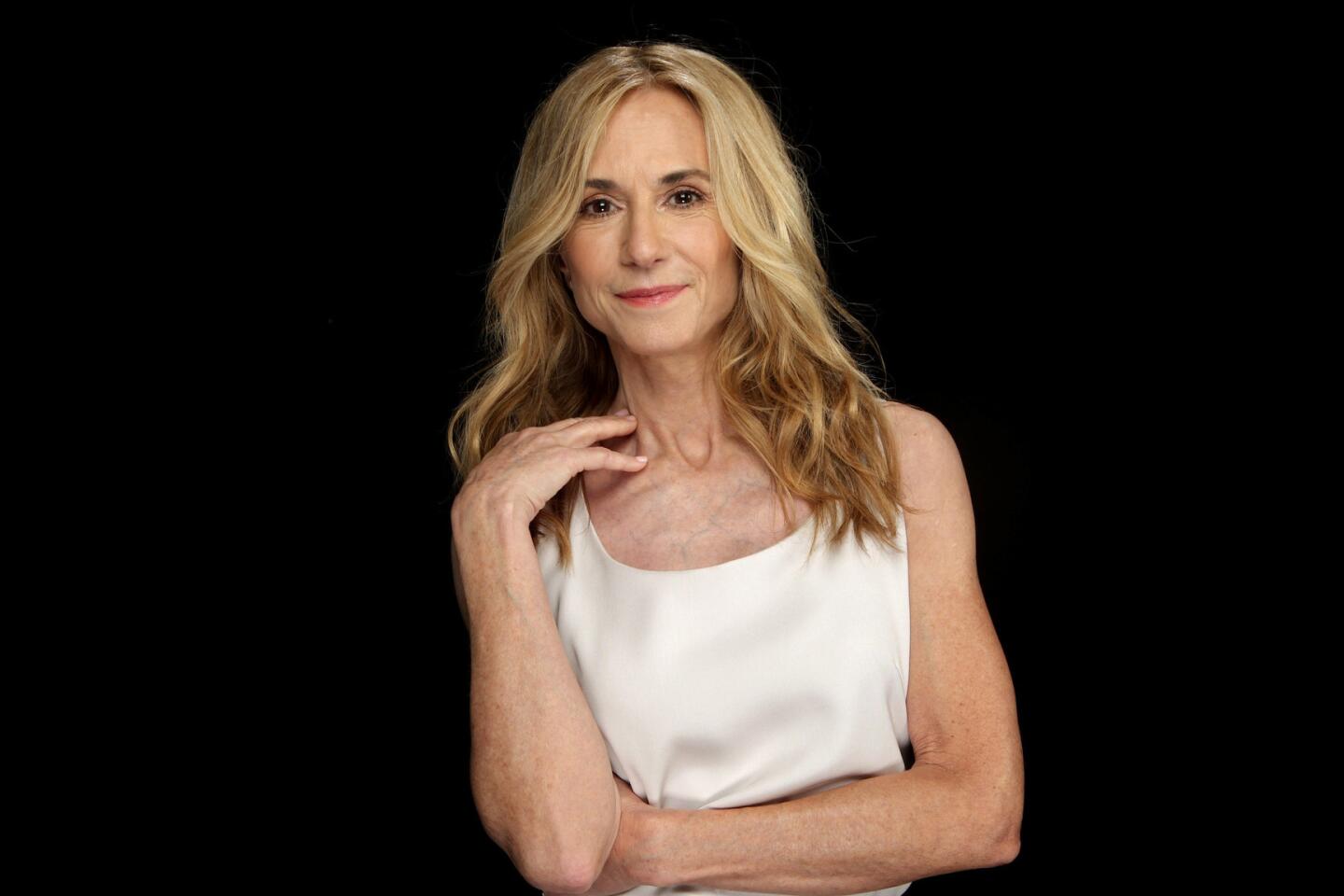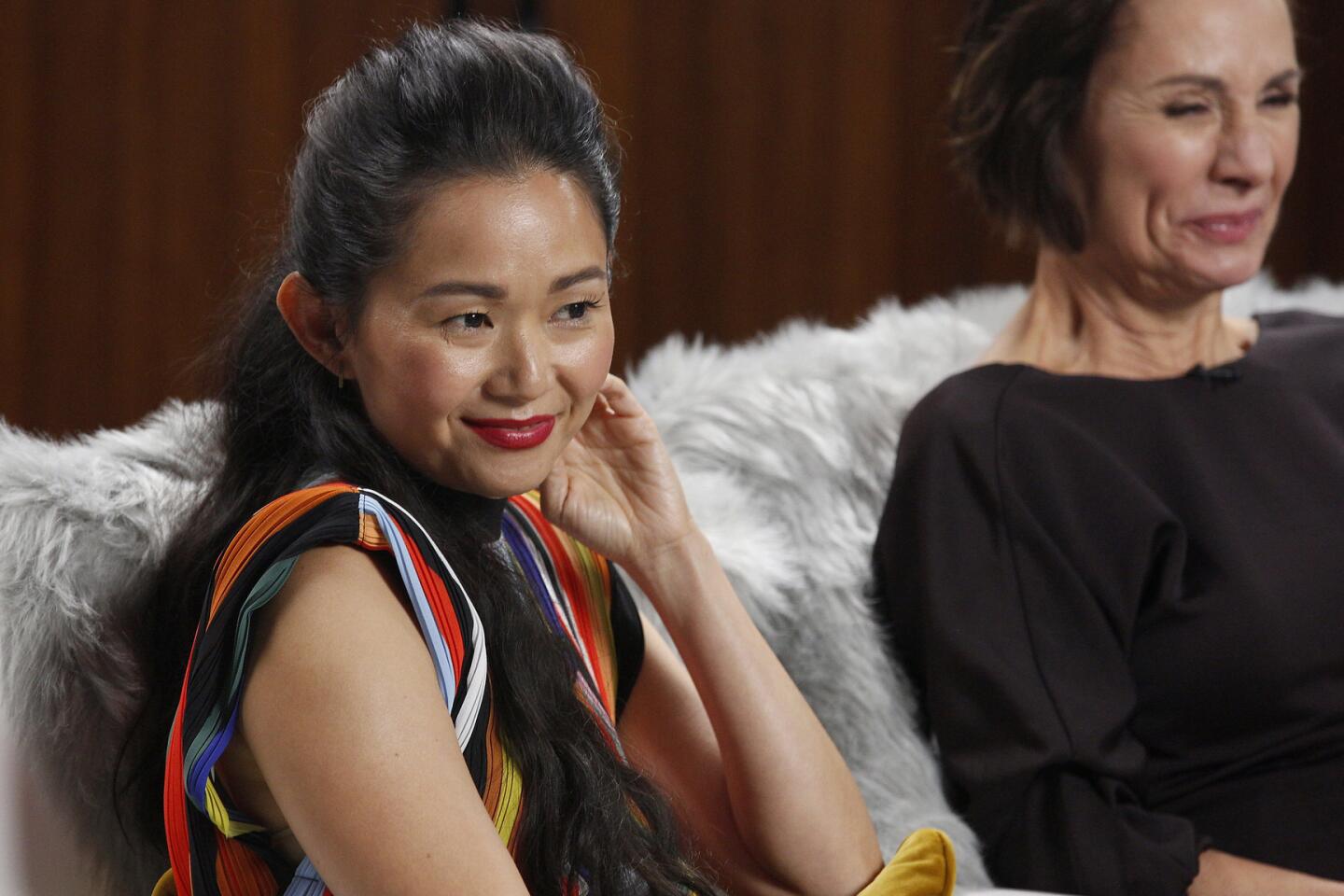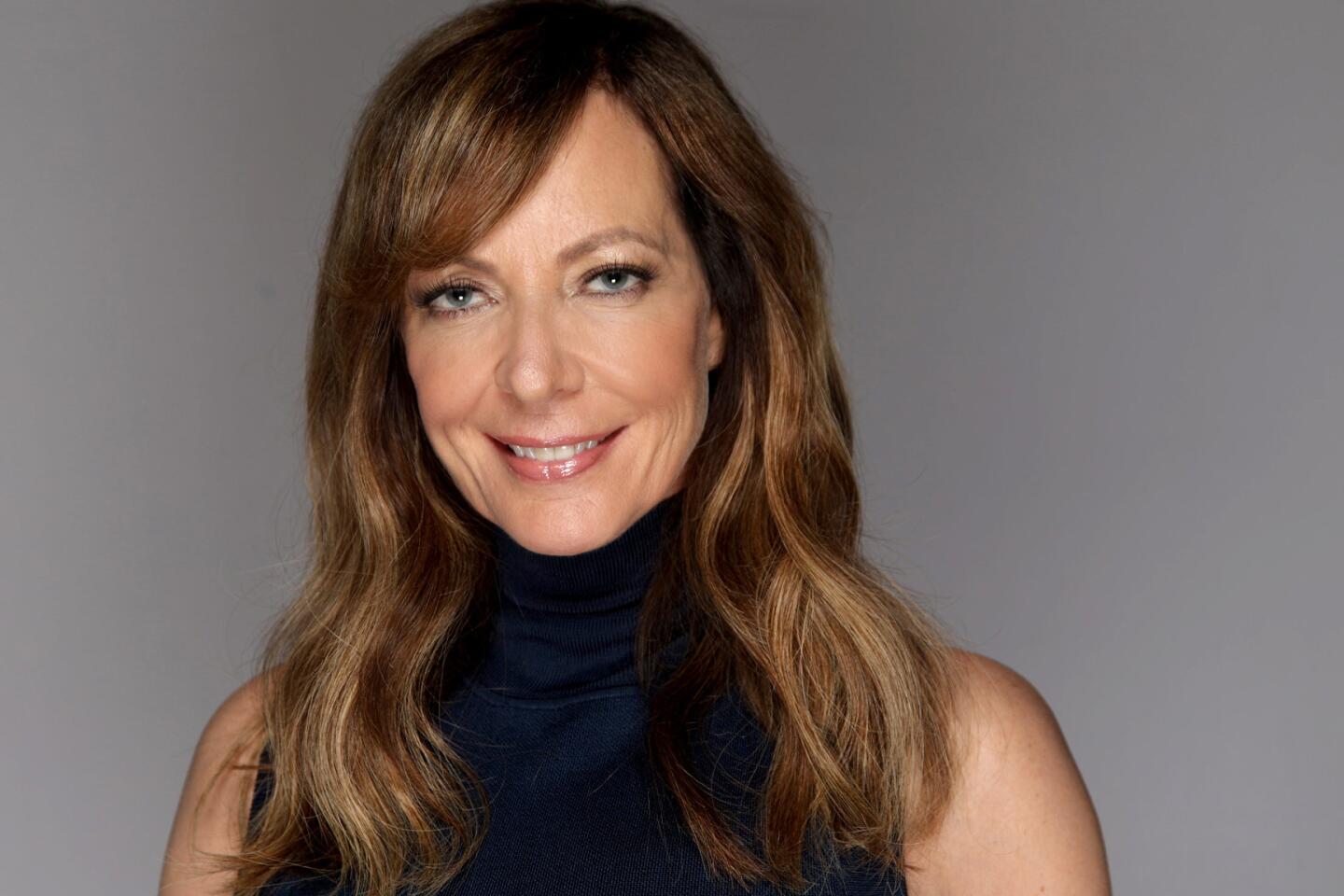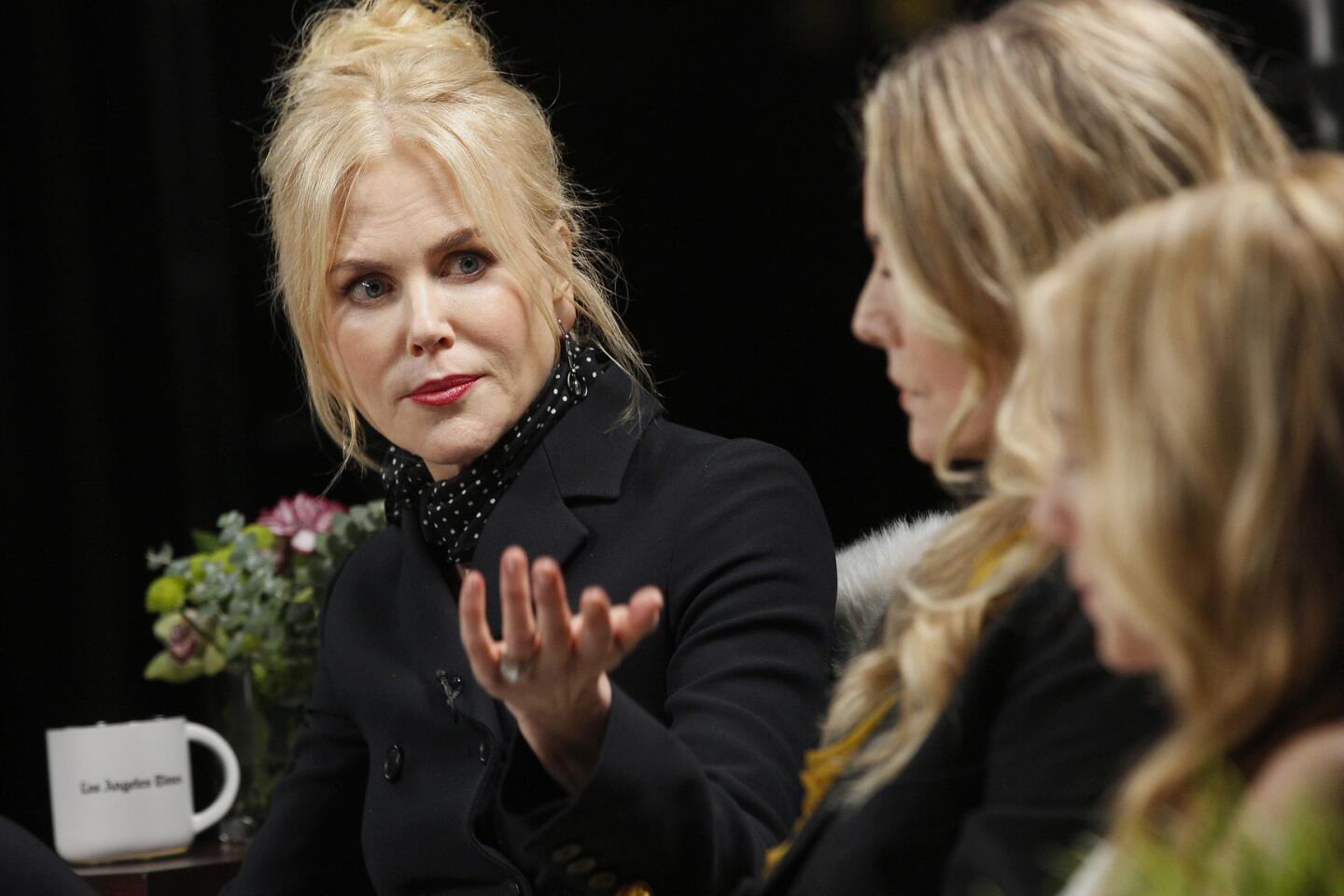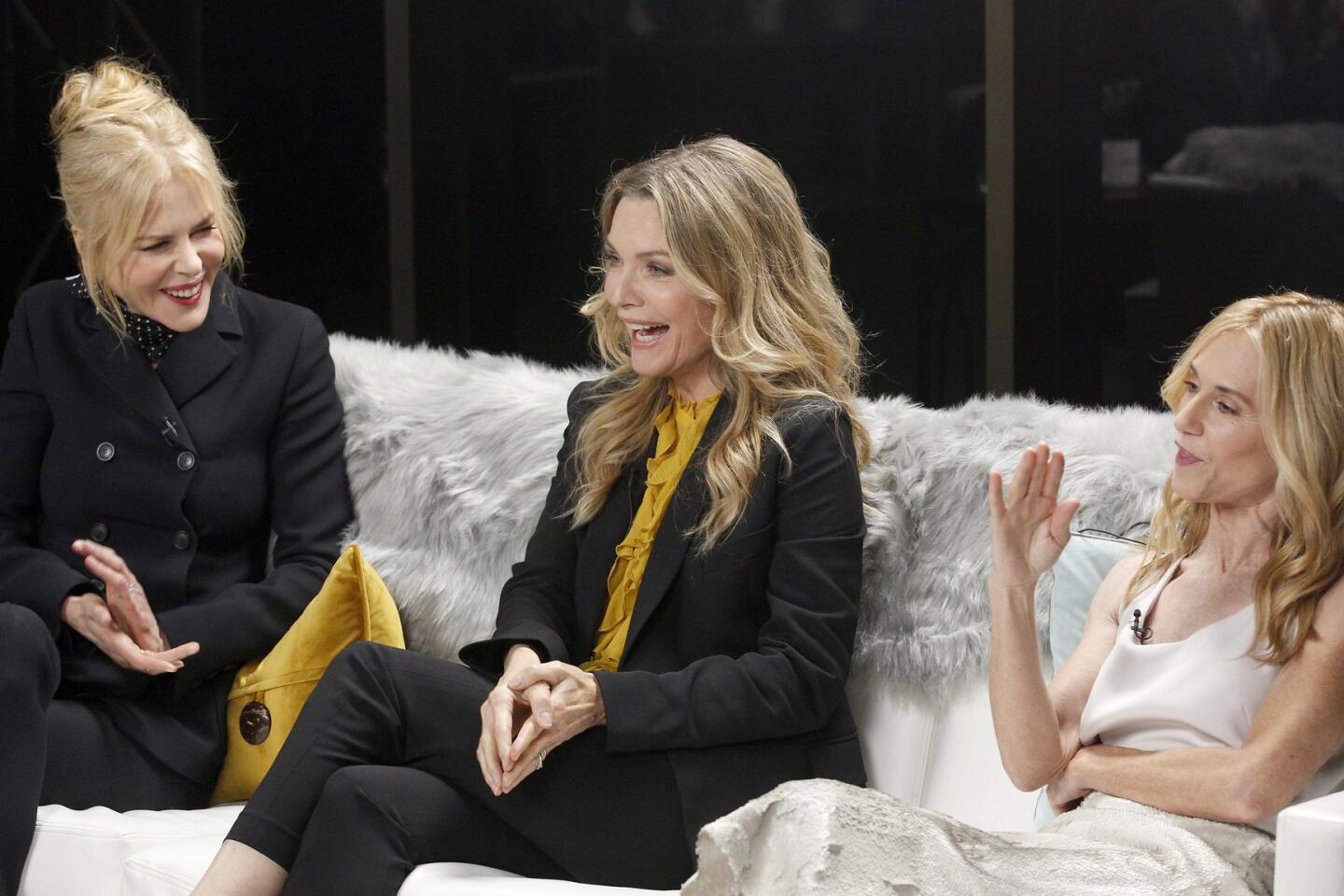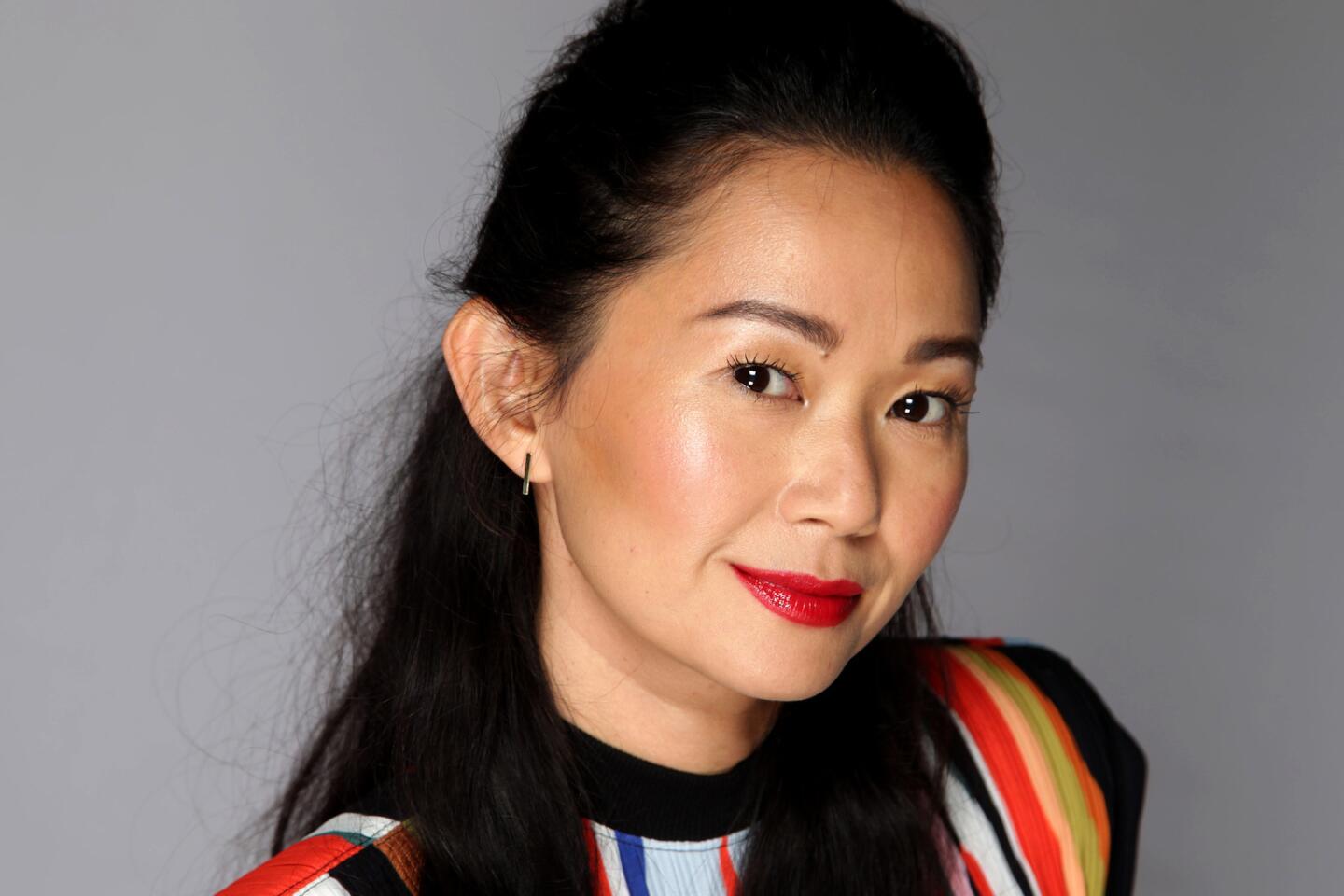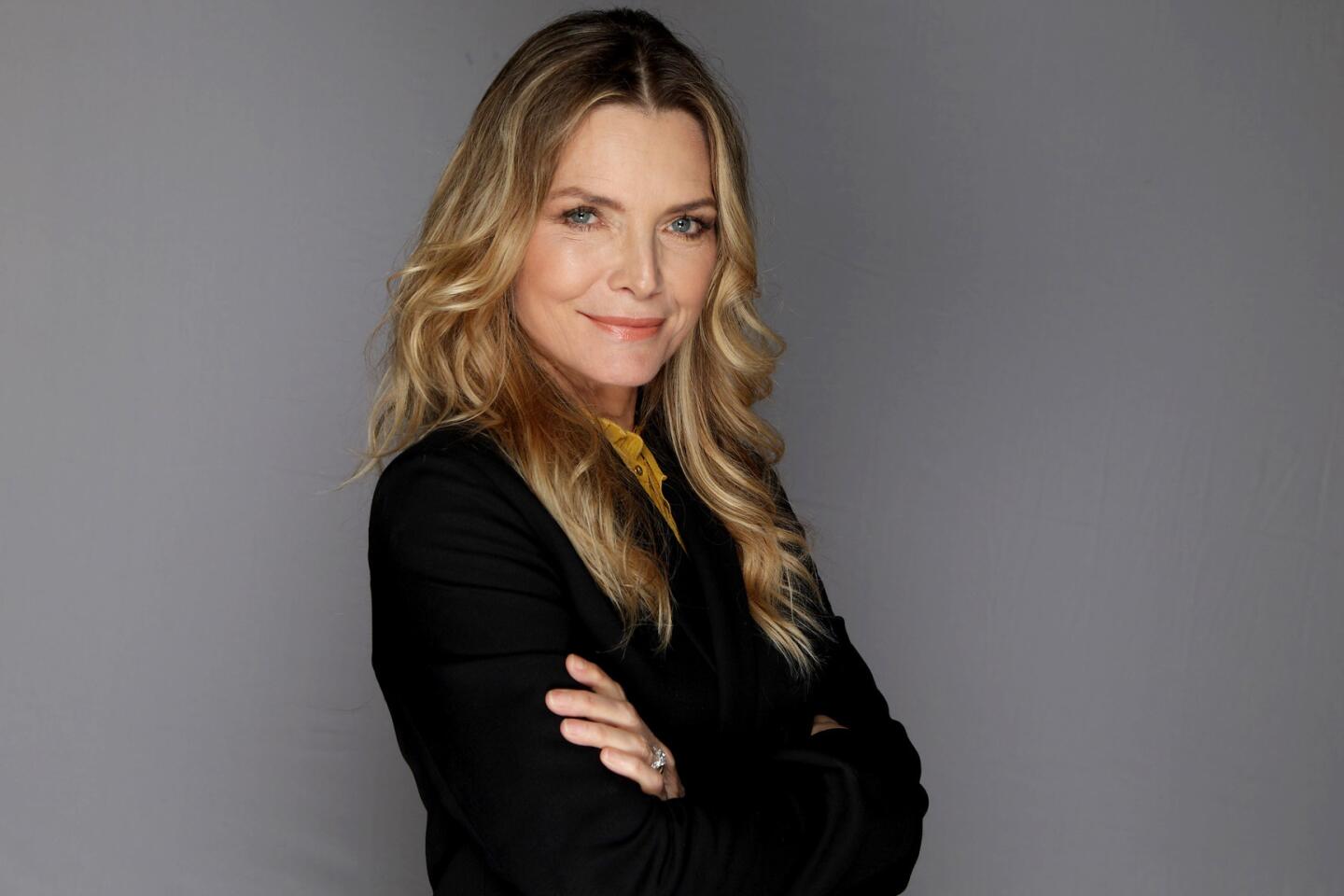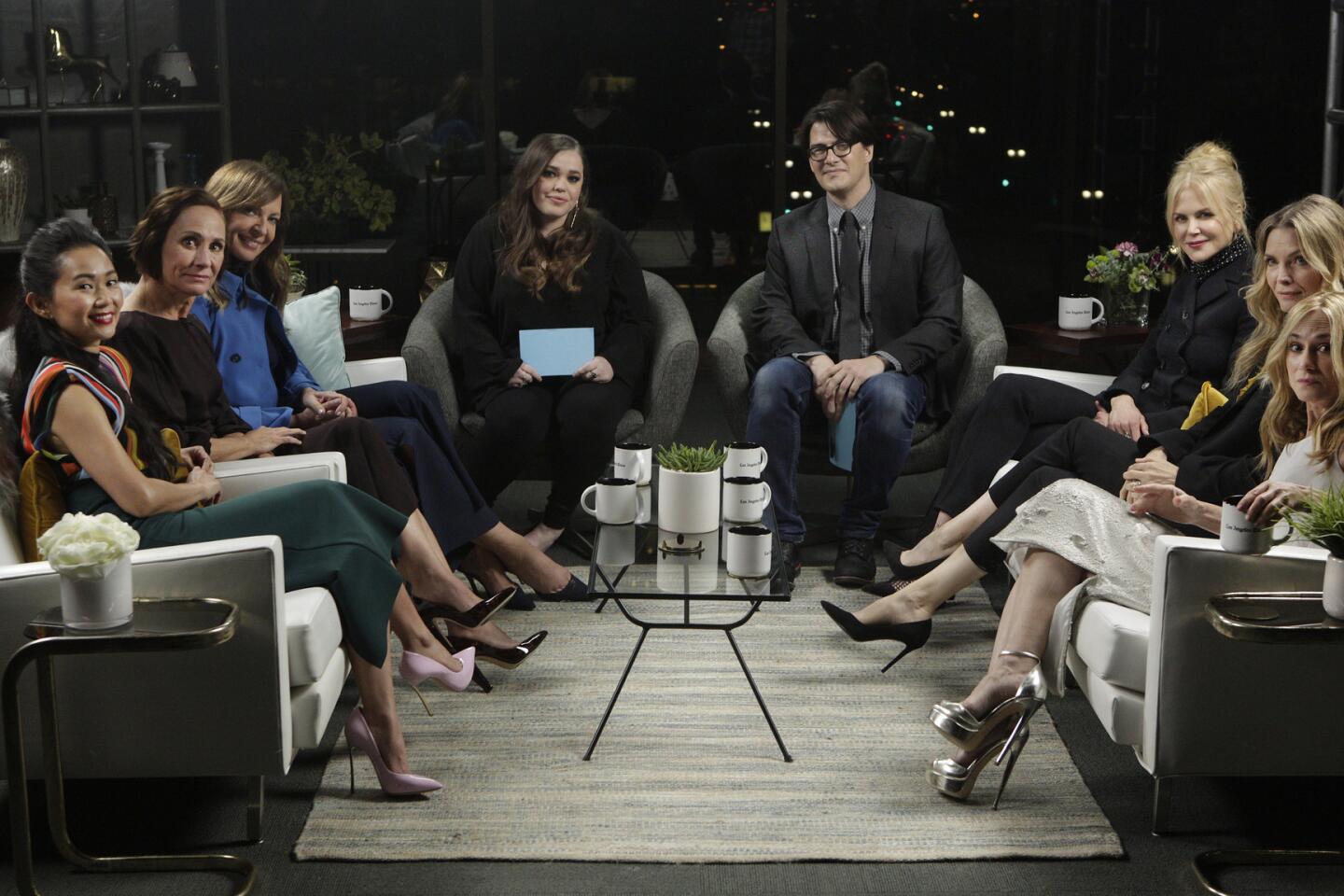Allison Janney, Laurie Metcalf and others share their thoughts on sexual misconduct, controversial films and the female gaze
- Share via
When these six actresses gathered with The Envelope to celebrate their films, they had much to say. And once they were on a roll with Times film writers Amy Kaufman and Mark Olsen, supporting actress contenders Hong Chau (Alexander Payne’s “Downsizing”), Holly Hunter (Michael Showalter’s “The Big Sick”), Allison Janney (Craig Gillespie’s “I, Tonya”), Nicole Kidman (Sofia Coppola’s “The Beguiled”), Laurie Metcalf (Greta Gerwig’s “Lady Bird”) and Michelle Pfeiffer (Darren Aronofsky’s “mother!”) had to be cut short to get them all out to their various appointments on time. Still, they covered a lot of ground — the veil of shame that has been lifted from Hollywood, polarizing films (did you love “mother!” or hate it?), sex scenes, throwing knives at people, oh, and the bird. We can’t forget that bird. Here’s an excerpt from the conversation edited for length and clarity.
Amy Kaufman: The industry is going through this transitional period, so what does it feel like to be a woman in Hollywood right now?
Laurie Metcalf: That’s a loaded question.
Allison Janney: It’s exciting to think of the culture changing. When I grew up, I always knew about this thing called “the casting couch,” and that that was something women had to navigate to get jobs. I never had to and I’m very grateful for that. But the fact that people are coming out and sharing things that they’ve been burdened with, and they’re free from them by telling their truth, it’s a very empowering time for women — but things probably won’t really change until women are paid equal for equal jobs.

Allison Janney from “I, Tonya,” shares how “it’s a very empowering time” now that people feel free to speak up about their experiences with sexual harassment.
Nicole Kidman: It’s actually hopeful, in the sense of people agitating for change, it’s good. It’s coming out of, I suppose, the secrecy is now being unveiled. That’s good.
Michelle Pfeiffer: I’ve had conversations with women that I’ve known my whole life. They know all of my secrets. But we’ve never had these conversations. And we’re having them now, and I realize one of the things that has kept it quiet has been this sort of veil of shame, in combination with, when something happens so much, it becomes normalized. Both of those things are being lifted, and I think that it will never be normalized again in the same way. And this veil of shame has been lifted. So I see a seismic change happening, and I’m very excited about it.
WATCH more Envelope Roundtables »
Janney: For the shame to shift to the abusers.
Pfeiffer: Exactly. Where it belongs.
Metcalf: And I feel hopeful that I sense in younger women — I remember being very green, being in an uncomfortable situation and not knowing what to do about it — I sense that they’re much more savvy now. So I think that that will also help, just to nip things in the bud.
Holly Hunter: It’s also social media. That has enabled this entire movement, and so many movements before it, to come to pass. And, you know, information travels so quickly. It is not the friend of the predator, you know? These things, the truth will out now much more quickly than it used to.
Hong Chau: Trying to be hopeful about this, [it] will also help in getting more inclusivity for women behind the camera, and in positions in production. And that might not have moved along as quickly if there hadn’t been this eruption of all of the knowledge that’s coming out about this.
Mark Olsen: Hong, with your film “Downsizing,” from the very first screenings of that movie, which hasn’t yet opened, it became somewhat controversial with regards to your character, a Vietnamese dissident. Some people felt it was a racial caricature. Other people felt the opposite. Did you even expect that conversation to erupt around the movie?
Chau: Erupt, no. I knew that it was sort of a tricky role, and a role that could really go off the rails very quickly, and that’s probably part of the reason why I wanted the role so badly. And I’ve never had the feeling before of, oh, I need to be the person to play this role. So it has been surprising because when I come out of a screening, and the feedback that I get from people, who are just regular audience members, they’re overwhelmingly positive about it. But the conversation that I’ve had with journalists or critics is very different, and I wonder if they actually have a problem with it, or if that’s, like, the interesting journalistic angle that they’re going for. So I always have to say, “What exactly do you have a problem with?”
Hunter: And then what do they say?
Chau: You know, they kind of just say, “Well, you have an accent.” My comeback is, “Did she come across as intelligent to you?” “Yeah, she did.” “So, OK, what’s the problem?” I don’t get it. I think there’s a difference between characters with an accent who have kind of just been in the background, or had two lines in something and haven’t been served by a script or the story. And with my character, where she is driving a good portion of the story, I just don’t think that they’re the same.
Kaufman: Speaking of controversial, Michelle, “mother!” is about one of the most controversial movies of the year. Did you know while you were filming it that this is going to be polarizing?
Pfeiffer: I think we all knew going into it that it was going to be very polarizing, and it didn’t disappoint. That’s the kind of filmmaker that Darren [Aronofsky] is, and it was what we all love about him is the risks that he takes. And I was really excited to work with him, really excited to work with this cast. And it scared me. I tend to gravitate towards things that frighten me. I spend most of my life afraid as a result.
[laughter]
Pfeiffer: I certainly pushed my comfort zone doing this.
Kaufman: How so?
Pfeiffer: I’m kind of a prude. And I was really nervous about doing that sex scene with Ed Harris. And we had lots of conversations about it. I don’t think there’s an actress working who hasn’t had to have these conversations with directors, and more than once. And it’s always an issue, and it’s always tense. You just want to know what they expect of you, what it’s going to be like on the day, and then I’m fine. So, I had the conversation with him. He was completely comfortable, told me exactly what he wanted to do, and what was expected of me, and it was exactly like that on the day. And it was very liberating for me. And I was really pleased with myself, actually.
[laughter]
Kaufman: In “I, Tonya,” there’s a lot of physical altercations between your character and her daughter Tonya, how do you navigate that?
Janney: There wasn’t a lot of time to rehearse those, and we shot in a real house, and the confines of the kitchen were unbelievably small. I mean, it was a little bit bigger than this rug. So we just had to dive in and work it out. And the scene where I have to throw the knife at her, we ...
Holly Hunter: What?
[laughter]
Janney: Yeah, I throw a knife.
Pfeiffer: It was kind of shocking.
Janney: It’s very shocking, and Tonya says it’s true, her mother threw a knife at her. I’m sure Tonya’s mother would say, you know, “I threw a roll at her.”
Pfeiffer: “Oh, I nicked her.” Oh, for God’s sakes.
Janney: I took the knife and I just said, “Don’t worry, I’m not going to hit you.” And, you know, it was a rubber knife, but I just swung it, and it went off into a plant or something. She had a lot more physical stuff with Sebastian Stan, who plays [her husband] Jeff Gillooly. They had a lot more choreography and dancing to work out with their fight stuff. … It’s sad how much violence was in her life, but it’s definitely not part of the entertainment of this story. It’s part of her story. It’s what she says happened to her, and that’s what we’re telling. Talking about what we were talking about earlier, the normality of it, you know, is just shocking. That’s what’s so weird, that they had this much violence.
Kidman: When you grow up with that kind of abuse, you think it’s normal.
Olsen: Holly, “The Big Sick” was written by the real couple, Kumail Nanjiani and Emily Gordon, and Kumail stars in the movie, although the actress Zoe Kazan plays Emily. You play Emily’s mother. Did this get at all confusing when you were shooting? And with Kumail there, what did that make the emotions of those scenes like?
Hunter: It didn’t get confusing. Ray Romano’s character and mine [as Emily’s parents] were very much fictionalized. Neither of us spoke with either of the parents before or during the shoot. We met them, like, when it premiered. So it was more of an imaginative process for both of us. But then I totally mined Kumail like crazy. And right before we’d roll, I would say, “Tell me about that day.” Like a vampire sucking out whatever I could from Kumail. So that was fun. But the rest of it felt like fiction.
Kaufman: Laurie, your movie explores the relationship between you and your daughter, which almost all of these films really do, but especially “Lady Bird.” How did you start to talk about the ups and downs of that teenage and mother relationship?
Metcalf: Well, I was living with a teenager in my house at the time. And I sucked that dry also, everything I could mine out of that. But it was all on the page in that beautiful script that Greta wrote. She had nailed the mother-daughter head-to-head battles. But then she also laced it through with little drops of heart, a tiny little moment here or there, like a Christmas morning where they’re all just actually enjoying themselves and opening up some presents, and it’s 30 seconds long. But those little things go a long way into helping you get through the rest of the time, when all they’re doing is triggering each other and being passive-aggressive with each other.
Olsen: Nicole, there was an earlier version of “The Beguiled,” and in that one your character is played by Geraldine Page. Did you watch that one and if so how did that inform your performance?
Kidman: Geraldine is one of the greats, so I watched the film as the film, but then working with Sofia, her take, I mean, Sofia is naturally, she’s just fem. What she brings is her feminine strength, actually. And she’s very accomplished. She knows exactly what she wants. It was being told by her through that lens, so it was a very, very different film. So I watched Geraldine, but then I went, OK, now I’ll go and do it, now I’ll go and play Miss Martha. So it was just different.
Olsen: What is it that Sofia does that feels different?
WATCH: Video Q&A’s from this season’s hottest contenders »
Kidman: Sofia creates an atmosphere. I mean, actually, Jane Campion was the one that said to me, she said Sofia is, she vibrates in this feminine place that is not as plot-driven as much as it’s atmospheric. And you go into her palette, and you exist in her world. And it’s Sofia’s world. And that’s a wonderful thing to have as a director, because a lot of directors are diluted. They don’t have that strong sense of what they do. And Sofia, you can tell her films, and how she shoots, and her structure, and her shots. And then you look at someone like Campion, who also has her own incredibly powerful way of telling a story that nobody else can do like her.
Hunter: Their point of view, their gaze is female. It’s unmistakable but yet I could never actually describe it. It feels kind of ephemeral.
Kidman: And we need more of it. I’m sorry to bring that up.
Olsen: Laurie, did you feel that with “Lady Bird”?
Metcalf: I would say the vibe was maternal. I felt like Greta was taking care of everybody. And she trusted everybody to do what their role was to do, cast and crew. And it made you want to show up the next morning, bright and early, and do it all again. And everybody was on Team Greta, you know, because she had poured her heart and soul into it. Everybody wanted to serve her. A stress-free set, and very collaborative.
Olsen: Hong, in some ways your character is like the key to the movie ...
Chau: A special sauce, yeah.
[laughter]
Olsen: Is that one of the things that appealed to you about it? She’s sort of like the secret heart of the movie.
Chau: Well, I think that Alexander Payne and Jim Taylor wrote it that way, and they had a love for the character. So you go in and you just do the character to the best of your ability, without thinking that I’m going to be the heart of the movie. You hope that you accomplish that, and I recognized it when I was reading it, and in conversations with Alexander. But again, when you have a lovely director who is, you feel supported, and the environment feels very nurturing, and the wonderful thing about Alexander is that he’s not shy about letting you know when he really likes something, and giving you compliments.
Olsen: Laurie, one thing I’m so taken with in “Lady Bird” is that in just one line, your character says she had an abusive mother and that’s why you behave the way you do. And it’s the kind of thing that in a lot of other movies might have been a whole big thing, but it’s really just one line. Did it feel like there was a lot of pressure and weight on that line, that you had to sell it in a big way?
Metcalf: No, I felt that the line was so powerful that it just was natural to downplay it. And I think Greta agreed. And she has many lines like that throughout the whole movie that are given by every character. Just, they seem sort of throwaway, and they really land with a lot of weight.
Kaufman: Every time we’re saying “Lady Bird,” I keep thinking about the bird in “I, Tonya.” Allison’s character has a bird on her shoulder for almost the whole movie.
Janney: The bird.
Kidman: A real bird?
Janney: It was a real bird. It was a little parrot named Little Man. And I had to, like, the day before we shot the scene, I met three birds. I auditioned them. And this little guy was the one who just chilled out on my shoulder and didn’t climb in my hair or go on my head. And I was, like, OK, this guy, he’s good. He gets the part. And then cut to the day we’re filming, and it really was an afternoon of shooting — we filmed my whole chunk in one day, and it’s cut up throughout the movie. And the bird just ...
Metcalf: He is a wonderful scene partner for you. He really is, because the timing the bird had is perfect.
Janney: I decided I didn’t want to look at the bird because that would make it seem like we had a relationship.
Pfeiffer: Like you cared about him.
Janney: He’s just my bird. I’m not going to look at him, I was just going to tell my story dead into the camera, and then he was, like, just [messing] with me. Just taking his beak, hitting in my ear, hitting on the oxygen thing, crawling down my jacket, getting on my drink. And the whole time, I was, like, I don’t care. You do whatever you want to do. I’m telling my story. Shut up. And I would start talking to him and telling him — it got me out of my head, you know, in kind of a good way, an unexpected way, because I really was determined to tell my story, and he was getting me mad. It sort of fed my telling of the story, and, you know, shut up. And it was very fun working with it — I really fell in love with the bird.
Olsen: Michelle, starting this year at Sundance, you had a movie there, and you’ve had kind of new projects coming out all year long, both “mother!” and “Murder on the Orient Express” just coming out. This all comes after you’ve taken some time away from acting. What was that like, to take a step back?
Pfeiffer: It wasn’t really a conscious decision. We had made a big move out of Los Angeles, and I think I underestimated what that entailed. And it wasn’t unusual for me to take a year or two off in between projects anyway. And then two years became three, and then, I don’t know, it was five. And it was when one of my children said to me, one day, “Mom, are you ever going back to work?” And I was, like, that kind of hurt my feelings.
More to Read
From the Oscars to the Emmys.
Get the Envelope newsletter for exclusive awards season coverage, behind-the-scenes stories from the Envelope podcast and columnist Glenn Whipp’s must-read analysis.
You may occasionally receive promotional content from the Los Angeles Times.
